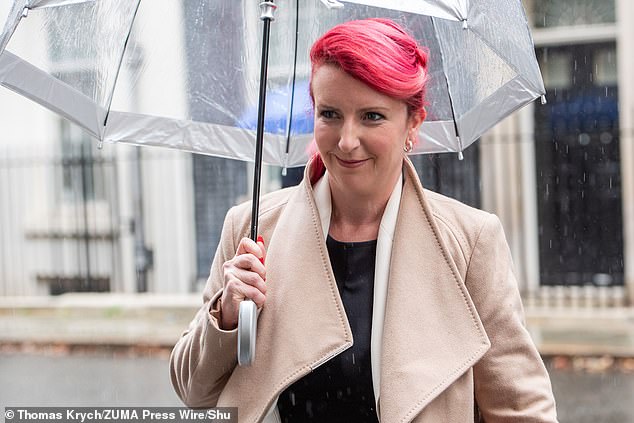The Government has demanded answers as to why the cost of car insurance has risen by 21 per cent in the last two years.
Insurers will also be questioned about those most affected by rising costs, including ethnic minorities, people on lower incomes and young and elderly drivers.
Transport Secretary Louise Haigh and Treasury Economics Secretary Tulip Siddiq have formed a working group.
The group will bring together industry groups and consumer advocates such as the Association of British Insurers (ABI), Citizens Advice, Which? and Compare the Market as well as insurance regulators.
It comes as car insurance premiums have risen by an average of 21 per cent since June 2022, according to analysis by the Financial Conduct Authority (FCA).
When it rains: Transport Secretary Louise Haigh wants to know why car cover costs have risen
Alternative figures from the ABI suggest that these premiums have actually increased by 48 per cent, from £470 a year in June 2022 to £622 a year in June 2024.
This figure is much higher than in comparable economies such as Germany, France, Spain and Italy.
The motoring organization says the cost of car tax and insurance together has risen by 224 per cent in the decade to September 2024.
The new task force will identify the reasons for the rapid rise in premiums and agree on solutions to keep costs under control.
Factors increasing the cost of insurance include inflation, increased car thefts, the cost of repairs for more advanced vehicles, and increasingly potholed roads.
The group will also assess whether consumers are receiving good value for money, using advice from regulators at the FCA and the Competition and Markets Authority (CMA).
Transport Secretary Louise Haigh said: “Car insurance is an essential, not a luxury.” It is vital to accessing economic opportunities and this Government is committed to controlling costs.
“That’s why we’re taking direct action to bring together insurance companies and regulators to discuss how we can crack down on rising costs.”
Is increasing auto premiums unfair?
Some experts in the world of auto insurance think that much of the increase in premiums is due to insurers’ own inefficiencies, for example in understanding and properly pricing risk.
Others say there is a “follow the leader” effect with auto insurers, where one company that raises prices causes others to follow – something hard to resist after years of tough price competition.
Likewise, insurers have been criticized for making radical statements about how difficult the sector is. The ABI often notes that insurers paid out £1.13 in claims in 2023 for every £1 collected in premiums, according to consultancy EY.
However, critics say These sums do not include the money that insurers make from investments, which can be enormous.
Matthew Maxwell Scott, chief executive of the Association of Consumer Support Organisations, said: “It is regrettable that the promised CMA/FCA inquiry, which would have been appropriately independent, has been shelved in favor of a largely industry-led approach. .
“Insurers made a fortune during the pandemic, but management largely failed to anticipate the direction the market would take post-pandemic, and customers paid the price through skyrocketing premiums.
“As auto insurance is a mandatory product, insurers need to be much more transparent about pricing, and especially when it comes to investment returns, as well as the benefits they make from customers who choose to pay your premiums monthly.
Critics also say the increases in auto premiums challenge the fact that the most important thing that auto insurance premiums pay for — bodily injury claims — is falling.
John Kushnick, director of legal operations at the National Accident Helpline, said: “While response and ‘direct action’ are welcome, this task force must get to the heart of rising premiums. The Department of Transportation has noted that certain factors, such as the auto theft epidemic and the inflation rate, are forcing insurance premiums to rise.
‘Ultimately, this is a case of UK car insurance payments falling far behind the rising cost of cover, due to the greed of insurers.
‘The ABI has attempted to blame a non-existent compensation culture, changing laws dramatically to make it harder to claim, while premiums continue to rise.
“Indeed, to justify removing the right to recover legal fees for whiplash claims, insurers promised to reduce premiums by a paltry £35, but even this failed to materialise.”
.
Some links in this article may be affiliate links. If you click on them, we may earn a small commission. That helps us fund This Is Money and keep it free to use. We do not write articles to promote products. We do not allow any commercial relationship to affect our editorial independence.



